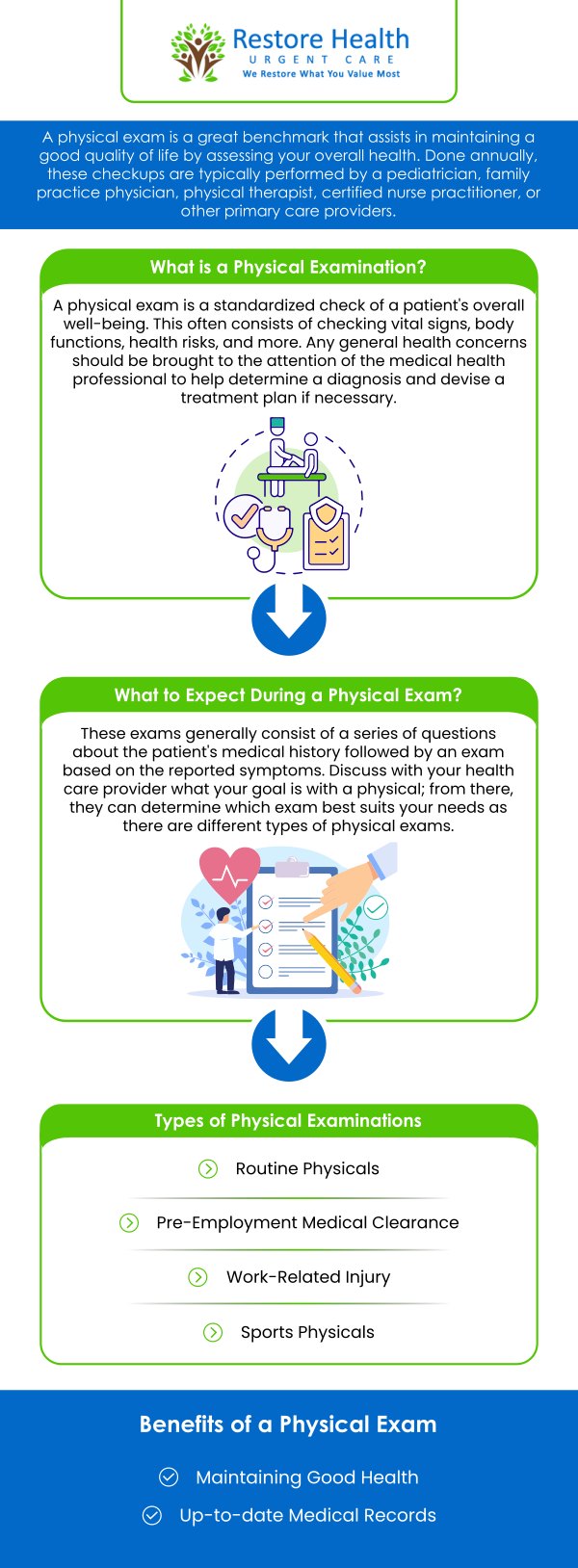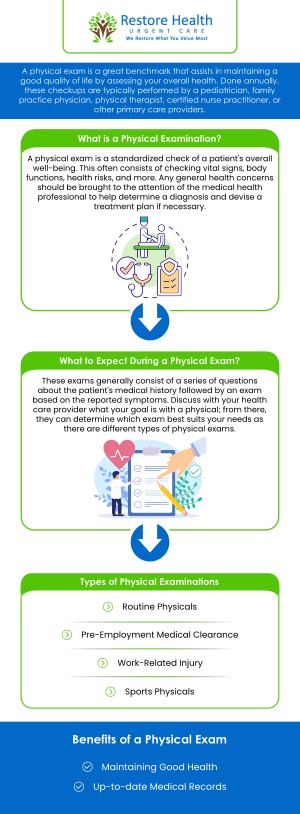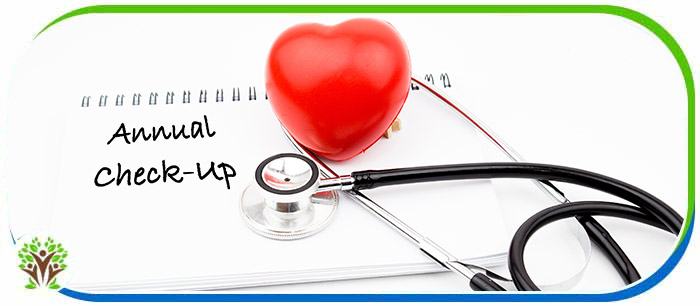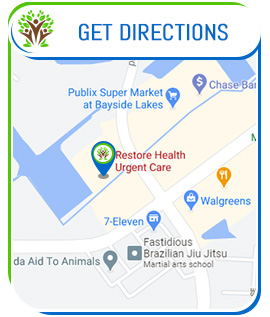Why Do You Need an Annual Physical Exam?
Annual physical exams are essential for assessing your health. Our team is always willing to assist. If you have previously had an abnormal physical, and unless otherwise advised by your doctor, annual physicals are often necessary and highly recommended for children and teens who are still developing. Visit us today and get your physical exam. For more information, reach out to us, walk in for a same-day visit, or book online to schedule an appointment – we’re open 7 days a week for your maximum convenience. We are conveniently located at 1840 Eldron Blvd SE. Suite 1 Palm Bay, FL 32909.




Table of Contents:
Why are annual physicals necessary?
What are the five reasons for physical exams?
What does a yearly physical include?
At what age should you get a physical every year?
Annual Physical Exams at Restore Health Urgent Care Support Long‑Term Wellness
Annual physicals are required for both children and adults. These examinations help keep people healthy by detecting any health problems early on. Patients also find that having regular checkups helps them avoid serious medical conditions. Doctors typically run through their checklists and provide advice to patients during annual physicals.
Annual checkups are primarily used to check for any health problems or issues a patient might have. Doctors run through patients’ health histories and ask questions about their health and well-being. This way, they can detect any health problems early on and take measures to treat them. It is also helpful for doctors to address any issues patients have before they become serious medical conditions.
Plus, annual physicals help patients stay informed about their health. People often have concerns about their health, but do not know how to address them with their doctor. An annual physical provides a safe space for these conversations to take place.
A physical exam is a series of tests performed on a patient by a doctor to determine the state of the person’s health. Generally speaking, an exam consists of several parts, including a health history, a general examination, and a specific examination. Each part provides valuable information to medical professionals and patients alike. All of this information helps doctors make medical decisions and treat patients effectively.
First, doctors conduct health history interviews to gather information about their patients. They record detailed information about their patient’s health history, general physical appearance, and behavior during the treatment. This helps doctors treat patients more effectively and avoid accidental poisoning when prescribing medicine. It also ensures that patients take the correct dosage of medication since doctors want to avoid complications arising from incorrect medication dosages. Additionally, the information gathered during a health history interview assists the doctors in making note of any significant health issues their patients may have. For example, if a patient has an arthritic joint, doctors may recommend extra caution when performing physical exams on that patient. Additionally, this information helps doctors determine the severity of the patient’s illness while making it easier for them to treat the patient’s condition effectively.
The physical examination is tailored to suit your individual needs and may include:
Health History: This is your opportunity to share any complaints or concerns about your health with your GP or nurse. Your vaccination status will be checked, and your personal and family medical history will be updated. Vital signs may include blood pressure, heart rate, respiratory rate, temperature, oxygen saturation, and weight.
Physical examination: The specific physical examination will depend on your personal medical history and risk profile. Physical examination may include the heart, lungs, head and neck, abdomen, skin, etc. For men, this may include an examination of the testicles, prostate, penis, or hernia. For women, it may involve a breast exam, a pelvic exam, or a Pap test.
Laboratory Tests: There are no standard laboratory tests, but your provider may order specific blood tests or diagnostic tests (X-rays, ultrasounds) based on your medical condition and needs.
Prevention: Your doctor can discuss specific preventive care measures related to your medical history and lifestyle, such as cancer screenings or STI screenings.
Health is a key factor in a person’s daily life. Many factors affect a person’s health, including diet, exercise, and sleep. People also have regular checkups with their doctors to ensure their bodies are functioning properly. For example, your parents may have gone through this as teens, it’s a good way for them to learn about why maintaining your health is good at any age.
Teens will need regular health checkups as they develop because they are at increased risk for certain diseases and injuries. For example, they are more likely to get sick from common infections, including the flu. They are also more likely to get injuries like cuts, bruises, and broken bones. Additionally, doctors will recommend checkups for all children as they age, and this is to help monitor their growth and development. This is due to children having different needs in comparison to adults when it comes to health monitoring. It is important to catch problems early on because it helps keep people healthy.
Usually, doctors will recommend an annual physical until you reach a certain age (around 21 years of age, depending on the clinic), and after that, you will be asked to complete a physical every 3 years, unless an abnormal physical is completed.
At Restore Health Urgent Care in Palm Bay, FL, annual physical exams are designed to give you a full picture of your health and catch potential issues early. During your visit, experienced providers review your medical history, assess vital signs, and perform a thorough head‑to‑toe evaluation, tailoring each exam to your specific needs. These check‑ups also include preventive screenings and personalized guidance on lifestyle and wellness. With convenient walk‑in access and comprehensive care, Restore Health Urgent Care makes maintaining your well‑being simple and accessible.
For more information, please contact us or book an appointment online. We are conveniently located at 1840 Eldron Blvd SE. Suite 1 Palm Bay, FL 32909. We serve patients from Palm Bay FL, Malabar FL, Melbourne FL, June Park FL, Brevard County, Indian River County, and surrounding areas.
Additional Services You May Need



